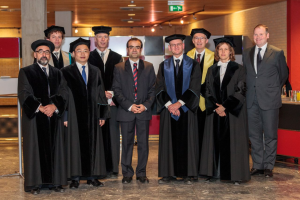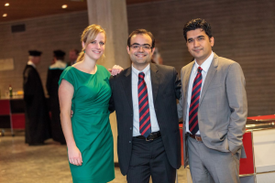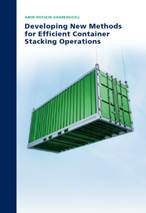PhD Defence: Developing New Methods for Efficient Container Stacking Operations
Developing New Methods for Efficient Container Stacking Operations
Container terminal operators are always on the lookout for ways to improve efficiency, by moving containers around and stacking them more efficiently, making port terminals more responsive and ultimately, able to operate in a smaller space. In all ports – including the port of Rotterdam where millions of containers are handled annually – the container stacking area is of special importance because almost all containers need to be stacked and often reshuffled before being transported to their final destination.
 In his PhD thesis entitled Developing New Methods for Efficient Container Stacking Operations, Amir Hossein Gharehgozli argues that port and terminal authorities can indeed optimise their stacking operations. He provides methods for minimising the makespan (the time taken for a particular job) of container yard cranes and he looks at how to minimise the number of container reshuffles. Due to these more efficient operations, terminal responsiveness will improve – and eventually, less land will be necessary to perform them.
In his PhD thesis entitled Developing New Methods for Efficient Container Stacking Operations, Amir Hossein Gharehgozli argues that port and terminal authorities can indeed optimise their stacking operations. He provides methods for minimising the makespan (the time taken for a particular job) of container yard cranes and he looks at how to minimise the number of container reshuffles. Due to these more efficient operations, terminal responsiveness will improve – and eventually, less land will be necessary to perform them.
Gharehgozli is currently involved in the Ultimate project (financially supported by Dinalog, the Dutch Institute for Advanced Logistics) in which he intends to put his theories into practice. In this project, he closely collaborates with other universities, deep-sea and hinterland terminals, barge operators, and software companies. The purpose of the project is to integrate supply chain and transportation by extending the sea terminal gate into the hinterland - the land space over which the port sells its services and interacts with its clients. The result is a huge number of containers directly forwarded to hinterland terminals. This requires hinterland terminals to improve their stacking operations to keep the same efficiency. Gharehgozli tries to integrate his proposed methods in terminal software to help improve stacking operations.
<link people amir-hossein-gharehgozli>Amir Hossein Gharehgozli defended his dissertation on 27 November 2012. His supervisor was <link people rene-de-koster>Professor René de Koster. His co-supervisor was <link people yugang-yu>Dr Yugang Yu. Other members of the Doctoral Committee were Professor Gilbert Laporte, Professor Rommert Dekker, Professor Iris Vis, Professor Rob Zuidwijk, Professor Bart Kuipers, and Professor Jan Tijmen Udding.
About Amir Hossein Gharehgozli
 Amir Hossein Gharehgozli (Iran, 1983) received his BSc in Industrial Engineering from Sharif University of Technology in 2005 and his MSc in Industrial Engineering from University of Tehran in 2008 both in Tehran, Iran. In September 2008, he joined RSM. His research interests include: container yard operations, transportation, logistics and supply chain management. His research findings have been presented in many international conferences including INFORMS Annual Meetings (2009, 2011, 2012), and European Conference on Operational Research (2009). He is currently a Postdoctoral fellow at RSM. He was a visiting scholar from June 2011 until September 2011 in the Department of Information Management and Decision Science, University of Science and Technology of China, Hefei, Anhui, China. Furthermore, he was a visiting scholar from September 2011 until December 2011 at Centre Interuniversitaire de Recherche sur les Réseaux d'Entreprise, la Logistique et le Transport (CIRRELT), Montréal, Québec, Canada, where he was working with Professor Gilbert Laporte.
Amir Hossein Gharehgozli (Iran, 1983) received his BSc in Industrial Engineering from Sharif University of Technology in 2005 and his MSc in Industrial Engineering from University of Tehran in 2008 both in Tehran, Iran. In September 2008, he joined RSM. His research interests include: container yard operations, transportation, logistics and supply chain management. His research findings have been presented in many international conferences including INFORMS Annual Meetings (2009, 2011, 2012), and European Conference on Operational Research (2009). He is currently a Postdoctoral fellow at RSM. He was a visiting scholar from June 2011 until September 2011 in the Department of Information Management and Decision Science, University of Science and Technology of China, Hefei, Anhui, China. Furthermore, he was a visiting scholar from September 2011 until December 2011 at Centre Interuniversitaire de Recherche sur les Réseaux d'Entreprise, la Logistique et le Transport (CIRRELT), Montréal, Québec, Canada, where he was working with Professor Gilbert Laporte.
Abstract of Developing New Methods for Efficient Container Stacking Operations
 Containerized transportation has become an essential part of the intermodal freight transport. Millions of containers pass through container terminals on an annual basis. Handling a large number of containers arriving and leaving terminals by different modalities including the new mega-size ships significantly affects the performance of terminals. Container terminal operators are always looking for new technologies and smart solutions to maintain efficiency. They need to know how different operations at the terminal interact and affect the performance of the terminal as a whole. Among all operations, the stacking area is of special importance since almost every container must be stacked in this area for a period of time. If the stacking operations of the terminal are not well managed, then the response time of the terminal significantly increases and consequently the performance decreases. In this dissertation, we propose, develop, and test optimization methods to support the decisions of container terminal operators in the stacking area.First, we study how to sequence storage and retrieval containers to be carried out by a single or two automated stacking cranes in a block of containers. The objective is to minimize the makespan of the cranes. Finally, we study how to minimize the expected number of reshuffles when incoming containers have to be stacked in a block of containers. A reshuffle is the removal of a container stacked on top of a desired container. Reshuffling containers is one of the daily operations at a container terminal which is time consuming and increases a ship's berthing time.
Containerized transportation has become an essential part of the intermodal freight transport. Millions of containers pass through container terminals on an annual basis. Handling a large number of containers arriving and leaving terminals by different modalities including the new mega-size ships significantly affects the performance of terminals. Container terminal operators are always looking for new technologies and smart solutions to maintain efficiency. They need to know how different operations at the terminal interact and affect the performance of the terminal as a whole. Among all operations, the stacking area is of special importance since almost every container must be stacked in this area for a period of time. If the stacking operations of the terminal are not well managed, then the response time of the terminal significantly increases and consequently the performance decreases. In this dissertation, we propose, develop, and test optimization methods to support the decisions of container terminal operators in the stacking area.First, we study how to sequence storage and retrieval containers to be carried out by a single or two automated stacking cranes in a block of containers. The objective is to minimize the makespan of the cranes. Finally, we study how to minimize the expected number of reshuffles when incoming containers have to be stacked in a block of containers. A reshuffle is the removal of a container stacked on top of a desired container. Reshuffling containers is one of the daily operations at a container terminal which is time consuming and increases a ship's berthing time.


